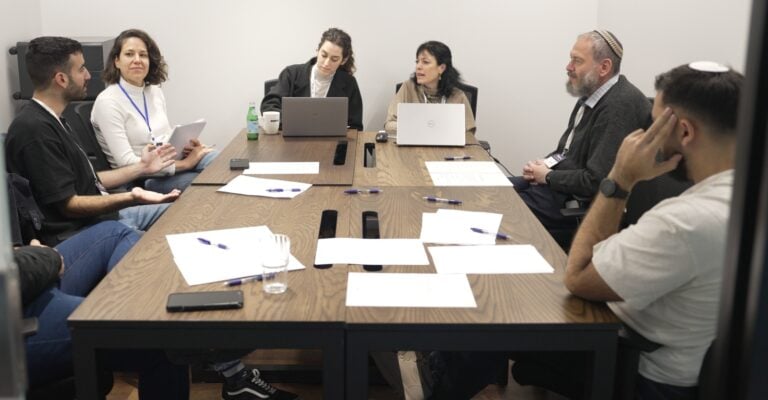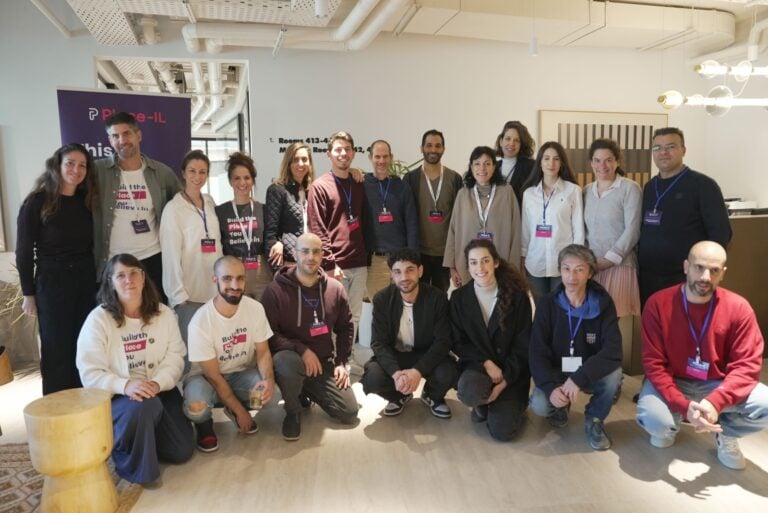Communities bordering Gaza may be no more than an hour’s drive from Tel Aviv, but as far as the Startup Nation is concerned, they barely register on the map.
The high-tech activity that drives Israel’s economy is concentrated within tight social and geographic boundaries. The overwhelming majority of the country’s 7,000-plus startups are located in the center of the country.
And the overwhelming majority of their employees share a very similar CV – white, Jewish, secular, served in a tech unit of the IDF, university educated in Tel Aviv or at the Technion in Haifa.
Place-IL is a nonprofit that seeks to disrupt high-tech recruitment by creating opportunities for the population groups that are most excluded, namely Arabs, ultra-Orthodox Jews and people from Israel’s “peripheria” – the commercially underdeveloped north and south.
Place-IL was founded in March 2022 and started successfully matching candidates and positions.
Then the October 7 massacre happened and everyone’s attention turned to the people of the Western Negev who were, and still are, grieving, devastated and displaced.
Place-IL took the decision there and then to crank up efforts to bring high-tech jobs to these people.
No need to relocate
Pairing up graduate candidates with a job — typically in development, automation or data analysis — is only part of the answer, said Keren Halperin-Musseri, CEO of Place-IL.
If they relocate to Tel Aviv, there’s no economic benefit to the Western Negev. It’s a loss rather than a gain. They must therefore be able to work remotely for much of the week.
That’s why Place-IL is opening a coworking hub in the center of Sderot, a city of around 30,000 people just a mile from the Gaza border.
Successful applicants will get to work for Tel Aviv startups without the need to relocate, or to sit for hours in traffic every day.
“From October 7, we understood that the people from the Western Negev will now find it very problematic to rehabilitate their lives because of the economic situation,” said Halperin-Musseri, a lawyer who served as a commander in the IDF’s 8200 signal intelligence unit and as a senior NGO manager.

“We think it’s the tech industry’s responsibility to be part of the economic growth of the Western Negev. There’s been almost no tech presence up to now.
“So we convinced the tech companies that are working with us to enable them to work in a hybrid model and come to the offices in Tel Aviv only a few days a week,” she tells ISRAEL21c.
Four-year plan
Place-IL aims to help up to 800 people from the region to get full-time, permanent high-tech jobs as part of its four-year plan. It partners with more than 50 companies, including Nvidia, Palo Alto Networks, Armis, Cisco, SalesForce and Hibob.
Things have changed somewhat since the organization was founded two years ago by Halpern-Musseri, together with serial tech entrepreneur Idan Tendler.
Back then it was boom time for Israel’s startups, and the biggest problem was a perceived skills shortage.
It was perceived rather than actual, claims Halpern-Musseri, because the startup community kept recruiting people with a very similar CV rather than tap into under-represented groups that had the skills but didn’t fit the mold.
“Companies would think about opening a remote site out of Israel before they’d think about recruiting people who are different from what they are used to hire,” said Halpern-Musseri.

Place-IL developed a screening process, based on tests, interviews and questionnaires, that recognized a candidate’s potential despite their lack of experience and presented their skills in a meaningful way to recruiters.
It also introduced the idea of paid internships – almost unheard of in the high-tech sector – allowing employers to see how a candidate performed before offering them tenure.
National Fund for High-Tech in the Negev
Since the scheme was launched, however, the startup world in general, and in Israel particularly, has suffered a sharp downturn, job losses and a hiring freeze.
Companies are no longer in a position to fund the internships, so Place-IL has turned to the government, Google (founding partner of Place-IL) other high-tech companies, and philanthropists to fund the internships.
They have jointly contributed most of the 3 million shekels ($800,000) needed for the National Fund for High Tech in the Negev.
“We need to help the companies fund the internship,” said Halpern-Musseri. “We can’t ask them to pay salary for someone they wouldn’t hire, because they don’t really need this kind of position right now. So we managed to raise money from the government, from the industry itself and from private donors.”
Place-IL currently has almost 50 candidates working in a high-tech internship for between six and 12 months. A third of them have already been offered jobs part way into the internship.
Of the target 800 people from the Western Negev, Place-IL expects 400 to land permanent jobs with their intern company. The remaining 400 will likely get a job with another employer.
A multitude of NGOs and other groups are also trying to find jobs for under-represented minorities, says Halpern-Musseri.
Place-IL stands out, she says, because it thinks like the employer rather than like the employee and recognizes that recruiters work by job description, not by the candidate’s background.
“We neutralize the cultural bias,” she said, and focus on soft skills – team working, self-learning, accepting feedback – in addition to professional ability.
For more information, click here.















